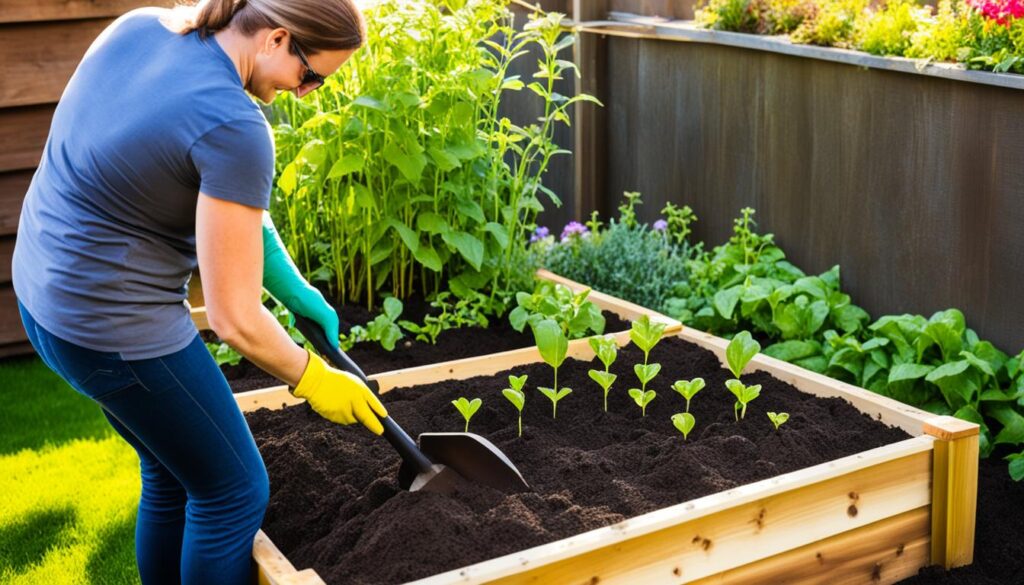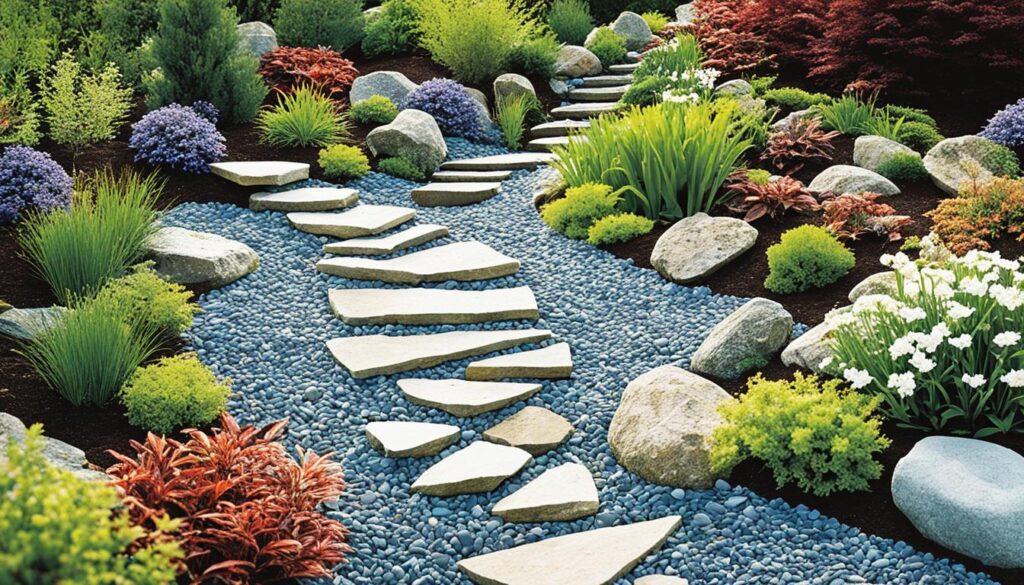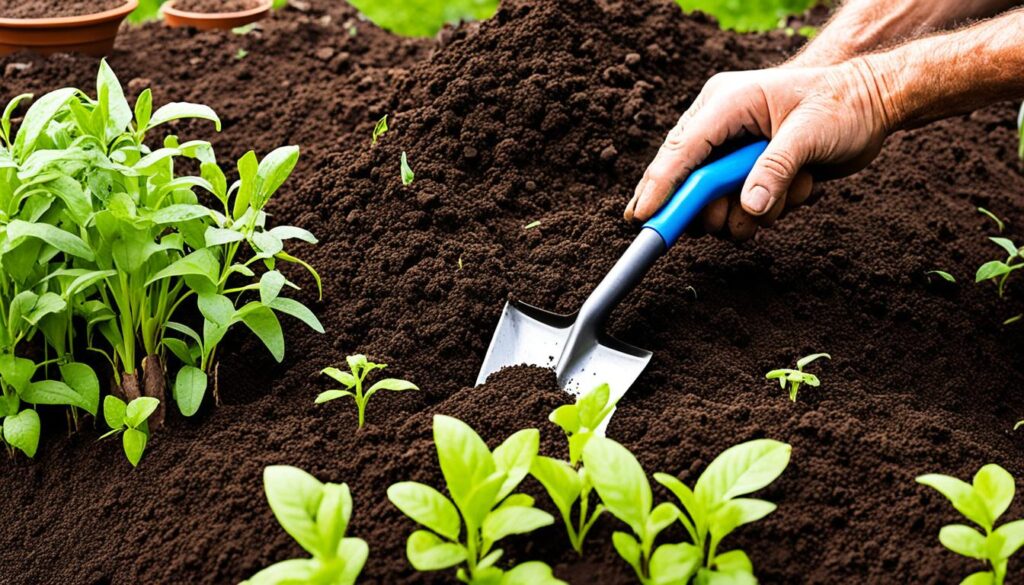As a gardener, I’m always on the lookout for ways to improve my plants’ health and productivity. One soil amendment that I have found incredibly beneficial is vermiculite. This naturally occurring mineral has the power to transform your garden by enhancing soil quality and promoting optimal plant growth. In this article, I will delve into the reasons why adding vermiculite to soil can be a game-changer for your gardening endeavors.
Key Takeaways:
- Vermiculite is a naturally occurring mineral that improves soil health and promotes plant growth.
- It is lightweight, non-toxic, and absorbs water and nutrients, making it ideal for various gardening applications.
- Vermiculite can be easily purchased from garden centres or online.
- Adding vermiculite to soil improves moisture retention, aeration, and nutrient exchange.
- It is a versatile soil additive that can be used in seed sowing, potting, and other gardening activities.
What is Vermiculite?
Vermiculite is a magnesium-aluminum-iron silicate mineral that is mined in various countries around the world. When heated, vermiculite expands into long strands resembling small worms.
It is lightweight, absorbent, and has a neutral pH. Vermiculite can absorb three to four times its weight in water and attracts various plant nutrients. These properties make it useful for improving soil texture and nutrient retention, thereby enhancing overall soil health.
The Properties of Vermiculite
Vermiculite possesses several important properties that contribute to its effectiveness as a soil conditioner:
- Lightweight: Its light weight allows for easy incorporation into soil and potted plants without causing compaction.
- Absorbent: Vermiculite can hold and release water efficiently, providing plants with consistent moisture while preventing waterlogging.
- pH Neutral: Its neutral pH ensures that vermiculite does not significantly alter the acidity or alkalinity of the soil.
- Water Retention: Vermiculite’s ability to hold moisture enhances soil water retention, reducing the frequency of watering.
- Plant Nutrient Attraction: Vermiculite attracts essential plant nutrients, ensuring they are readily available to support healthy plant growth.
Vermiculite as a Soil Conditioner
As a soil conditioner, vermiculite improves the physical and chemical properties of soil, making it more conducive to plant growth. It enhances soil structure, promotes aeration, and increases water and nutrient retention. Vermiculite’s ability to hold moisture and nutrients near plant roots helps establish strong root systems and supports vegetation in challenging growing conditions.
Vermiculite’s lightweight nature and exceptional water retention make it an excellent choice for improving soil quality and creating an optimal environment for plants to thrive.
How to Use Vermiculite
Vermiculite is a versatile soil additive that offers numerous benefits for gardening. It can be used in various ways to enhance soil and promote optimal plant growth. Whether you’re starting seeds, potting seedlings, or tending to houseplants, vermiculite can be your go-to gardening companion.
Here are some practical ways to use vermiculite in your garden:
- Seed Sowing Mixtures: Add vermiculite to your seed sowing mixtures to improve moisture retention and enhance germination. The lightweight and absorbent nature of vermiculite provides an ideal environment for seeds to sprout and thrive.
- Pricking Out and Potting On: Use vermiculite for pricking out and potting on seedlings. Mix it with potting soil to improve aeration and moisture-holding capacity, giving your young plants a healthy start.
- Mixing with House Plant Compost: Incorporate vermiculite into your house plant compost to improve its texture and water-holding ability. The fine particles of vermiculite help to create a well-draining yet moisture-retentive medium that houseplants will love.
One of the key benefits of using vermiculite is its ability to enhance soil moisture retention while ensuring proper aeration. This makes it particularly suitable for plants that thrive in moist conditions. Vermiculite acts like a sponge, absorbing water and releasing it slowly to the roots, preventing waterlogged conditions.
Vermiculite can also be used in combination with other soil additives, such as perlite, to create a well-balanced growing medium. While vermiculite retains moisture, perlite improves soil drainage and aeration. The combination of these two additives can create an optimal environment for plant growth.
When using vermiculite, remember to wear gloves to protect your hands and minimize direct contact with the material. Additionally, store vermiculite in a dry area to maintain its moisture-absorbing properties.
“Vermiculite is a game-changer in gardening. Its unique properties improve soil texture, moisture retention, and overall plant health. Incorporating vermiculite into my gardening routine has yielded excellent results, especially for moisture-loving plants. I highly recommend giving it a try!” – Jane, Gardening Enthusiast


| Vermiculite Uses in Gardening | Benefits |
|---|---|
| Seed Sowing | Improves moisture retention and germination |
| Pricking Out and Potting On | Enhances aeration and root development |
| House Plant Compost | Improves soil texture and water-holding capacity |
Vermiculite or Perlite?
When it comes to improving soil, both vermiculite and perlite are commonly used as soil conditioners. However, they have distinct properties and applications.
Vermiculite is an excellent choice for enhancing water and nutrient retention in the soil. Due to its ability to absorb and hold moisture, vermiculite creates a favorable environment for plants that require more moisture. It acts as a sponge, preventing water runoff and providing a steady supply of moisture to plant roots. Additionally, vermiculite attracts and holds onto nutrients, ensuring they are easily accessible for plant uptake. This makes it an ideal soil conditioner for improving soil structure and fertility.
“Vermiculite’s moisture-retention properties make it suitable for plants that require more moisture.”
Perlite, on the other hand, is primarily used to improve soil drainage and aeration. It is a lightweight volcanic glass that creates air pockets in the soil, allowing for better oxygen flow to plant roots. This helps prevent root rot and encourages healthier root development. Perlite also aids in preventing soil compaction, ensuring that excess water drains more efficiently. It is particularly beneficial for plants that prefer well-draining soil conditions.
When deciding between vermiculite and perlite, it is essential to consider the specific needs of your plants and the existing soil conditions. Some plants thrive in moist environments and benefit from vermiculite’s water-retention properties, while others require well-draining soil and can benefit from perlite’s ability to enhance soil aeration and drainage.
You can also use a combination of vermiculite and perlite to create an optimal growing medium. The vermiculite will improve moisture retention, while the perlite will enhance soil drainage. This combination allows for a balanced soil structure that provides both adequate moisture and excellent oxygenation for plant roots.
A Comparison of Vermiculite and Perlite
| Vermiculite | Perlite |
|---|---|
| Improves water retention | Enhances soil drainage |
| Retains and releases nutrients | Promotes soil aeration |
| Creates a favorable environment for moisture-loving plants | Prevents soil compaction |
| Lightweight and easy to mix into soil | Lightweight and improves soil structure |
Remember, the choice between vermiculite and perlite ultimately depends on the specific needs of your plants and the soil conditions you are working with. Understanding their unique properties and applications will help you make an informed decision to optimize your soil and promote healthy plant growth.


Is Vermiculite Safe to Use?
When it comes to using vermiculite in gardening, safety is a valid concern for many. Rest assured, vermiculite is safe to use as a soil amendment and is mined according to strict industry protocols.
However, it is recommended to take necessary precautions when handling vermiculite, just as you would with any gardening medium. Wearing gloves can help protect your skin from drying and potential irritation.
It’s important to note that the presence of asbestos in vermiculite was limited to a specific mine in Libby, Montana, USA, which closed in 1990. Since then, modern vermiculite undergoes rigorous testing to ensure it is free of asbestos contamination. So you can confidently use vermiculite in your gardening endeavors without worry.
By using vermiculite, you can reap the full benefits it offers to improve your soil and enhance plant growth.
Comparing the Benefits of Vermiculite and Perlite
| Vermiculite | Perlite |
|---|---|
| Promotes moisture retention | Aids in soil drainage and aeration |
| Enhances nutrient exchange in the soil | Improves soil structure |
| Regulates water availability to plants | Prevents soil compaction |
| Lightens heavy soils | Provides insulation to plant roots |
The benefits of vermiculite and perlite can complement each other, making them valuable additions to any gardening regimen. Depending on your specific needs, you can choose to use vermiculite, perlite, or a combination of both to achieve the desired soil conditions.
Where and How to Buy Vermiculite
If you’re looking to enhance your gardening experience with vermiculite, you’ll be glad to know that it’s readily available for purchase. There are several options for buying vermiculite, whether you prefer the convenience of online shopping or the personal touch of visiting a local store.
Physical Stores
Vermiculite can be easily purchased at several types of physical stores, including nurseries, garden centres, and popular DIY stores such as B&Q and Wilko. These retailers offer a range of gardening products, including vermiculite, allowing you to browse and make your purchase in person.
Online Retailers
If you prefer the convenience of online shopping, there are numerous online retailers where you can buy vermiculite. A simple search using your preferred search engine will yield several options. It is best to choose reputable suppliers that specialize in horticultural products to ensure you’re getting high-quality vermiculite specifically prepared for gardening purposes.
When buying vermiculite online, you’ll find that it typically comes in small to medium-sized bags, which are suitable for most gardening needs. As vermiculite is lightweight, it is also easy to order for home delivery, saving you the hassle of carrying heavy bags.
Remember, when purchasing vermiculite, always verify that the product is intended for horticultural use, as it may differ from other types of vermiculite that are used for industrial purposes.
| Retailer | Physical Locations | Online Availability |
|---|---|---|
| Nurseries | Yes | No |
| Garden Centres | Yes | No |
| DIY Stores (B&Q, Wilko) | Yes | No |
| Online Retailers | No | Yes |


Benefits of Adding Vermiculite to Soil
Adding vermiculite to soil offers numerous benefits for plant growth and soil health. Vermiculite is a versatile mineral that can significantly enhance the quality of your soil, creating an optimal environment for plants to thrive.
Improved Moisture Retention
Vermiculite has a high water-holding capacity, allowing it to absorb and retain moisture in the soil. This is especially beneficial in dry climates or for plants that require consistent moisture. By adding vermiculite to your soil, you can help regulate water availability to plants, ensuring they receive adequate hydration even during periods of drought.
Promotes Proper Aeration
Proper aeration is essential for healthy root development in plants. Vermiculite improves soil structure and prevents compaction, creating air channels that facilitate oxygen exchange. This promotes the growth of strong and healthy roots, enhancing the overall vigor and resilience of your plants.
Enhances Nutrient Exchange
Vermiculite has the unique ability to attract and hold nutrients in the soil, making them readily available to plants. This promotes efficient nutrient uptake and enhances the overall fertility of your soil. By adding vermiculite, you can optimize the nutrient exchange process, ensuring that your plants receive the essential elements they need for growth and development.
Prevents Root Rot and Damping Off
Inadequate soil drainage can lead to root rot and damping off, which can be detrimental to plant health. Vermiculite improves soil drainage, preventing waterlogged conditions that can suffocate roots and promote the growth of fungal pathogens. By incorporating vermiculite into your soil, you can create a well-drained environment that reduces the risk of these common plant diseases.
Lightens Heavy Soils and Improves Drainage
Heavy clay soils can be a challenge for many gardeners. Vermiculite acts as a soil amendment, lightening heavy soils and improving their structure. It loosens compacted soil particles, allowing for better water penetration and drainage. This helps to create an optimal growing environment for plants, particularly those that prefer well-drained soils.
Adding vermiculite to your soil is a simple and effective way to improve its overall health and fertility. Whether you’re a seasoned gardener or just starting out, incorporating vermiculite into your gardening practices can have a significant impact on the success and productivity of your plants.
Practical Uses of Vermiculite in Gardening
Incorporating vermiculite in your gardening practices can bring about several benefits to your plants and soil. Its versatile nature makes it an excellent choice for various applications. Let’s explore some of the practical uses of vermiculite:
Improving Soil Texture and Nutrient Retention
Vermiculite proves to be an effective agent for enhancing soil texture and structure. When mixed with soil or compost, it helps create a lighter and more friable growing medium. The mineral’s ability to absorb moisture and nutrients allows for better retention, ensuring that your plants receive a consistent supply of vital elements.
Promoting Optimal Root Growth and Moisture Retention
The use of vermiculite aids in promoting the healthy development of roots. Its porous nature facilitates adequate air circulation within the soil, preventing root suffocation. Additionally, the mineral’s superior water-holding capacity ensures that moisture is evenly distributed, reducing the risk of over or under-watering your plants, especially in containers, raised beds, and garden beds.
Enhancing Seed Starting and Rooting Cuttings
Vermiculite is an excellent medium for starting seeds and rooting cuttings. Its water-absorbing properties provide optimal moisture levels necessary for successful germination and rooting. It creates a supportive environment for tender roots, helping them establish faster and stronger, giving your plants a head start in their growth journey.
Storing Bulbs and Root Crops Over Winter
Vermiculite plays a significant role in the preservation of bulbs and root crops during the winter months. The mineral acts as an insulator, protecting them from extreme temperature fluctuations. By storing your bulbs and root crops in a container with vermiculite, you can maintain the required cool and moist conditions, ensuring their viability until the next growing season.
Additionally, vermiculite can be used in combination with other components to create customized soilless potting mixes. Its neutral pH makes it suitable for a wide range of plants and gardening practices.
Remember to always follow the recommended guidelines for the specific plants you are growing and adjust your vermiculite usage accordingly.
| Gardening Application | Benefits |
|---|---|
| Improving soil texture and nutrient retention | Enhances soil structure, promotes better nutrient absorption |
| Promoting optimal root growth and moisture retention | Aids in root development, ensures consistent moisture levels |
| Enhancing seed starting and rooting cuttings | Facilitates successful germination and rooting |
| Storing bulbs and root crops over winter | Preserves and protects crops during dormant periods |
A table summarizing the practical uses of vermiculite in gardening.
Vermiculite vs Perlite: Choosing the Right Soil Additive
When it comes to improving soil quality, two popular soil additives are vermiculite and perlite. Both serve different purposes and offer unique benefits in gardening. Understanding their specific properties and applications will help you make an informed decision.
Vermiculite is an excellent choice for improving water absorption and retention in the soil. Its lightweight and absorbent nature allow it to hold moisture, promoting healthy root development and reducing the risk of drought stress. Vermiculite also aids in nutrient retention, ensuring that plants have access to essential elements for optimal growth.
On the other hand, perlite is widely used to enhance soil aeration and drainage. Its porous structure allows for increased airflow and prevents waterlogged soil, preventing root rot and other water-related issues. Perlite is particularly beneficial for plants that prefer well-draining conditions, such as succulents and cacti.
When deciding between vermiculite and perlite, consider your plants’ specific needs and the existing soil conditions. If your plants require better water retention, opt for vermiculite. If soil drainage and aeration are the primary concerns, perlite is the way to go. In some cases, using a combination of both additives can create the ideal soil environment for your plants.




